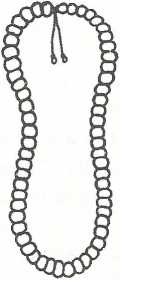Akṣamālā
By Swami Harshananda
Akṣamālā literally means ‘rosary of rudrākṣa beads’.
Japa or repetition of a mantra (a set of religious formula or a name of God or of a deity) is considered an important aspect of spiritual and religious discipline. Since a count of such repetition should be kept, devices for keeping such count are common to all religions. One important device is the mālā or rosary.
A rosary made of rudrakṣa beads called aksamālā (Elaeocarpus ganitrus or its berries) is very common. The number of beads may vary from 32, 54, 64 or 108. There will be one bead extra, which will be bigger than the others or fixed above the others. This is called ‘meru’ and should not be crossed over during counting. Certain icons of gods (for e. g., Śiva, Sarasvati, Brahmā) are shown with the akṣamālā in one of their hands.
Vasiṣṭha’s wife Arundhatī is sometimes known as Akṣamālā.
References[edit]
- The Concise Encyclopedia of Hinduism, Swami Harshananda, Ram Krishna Math, Bangalore

